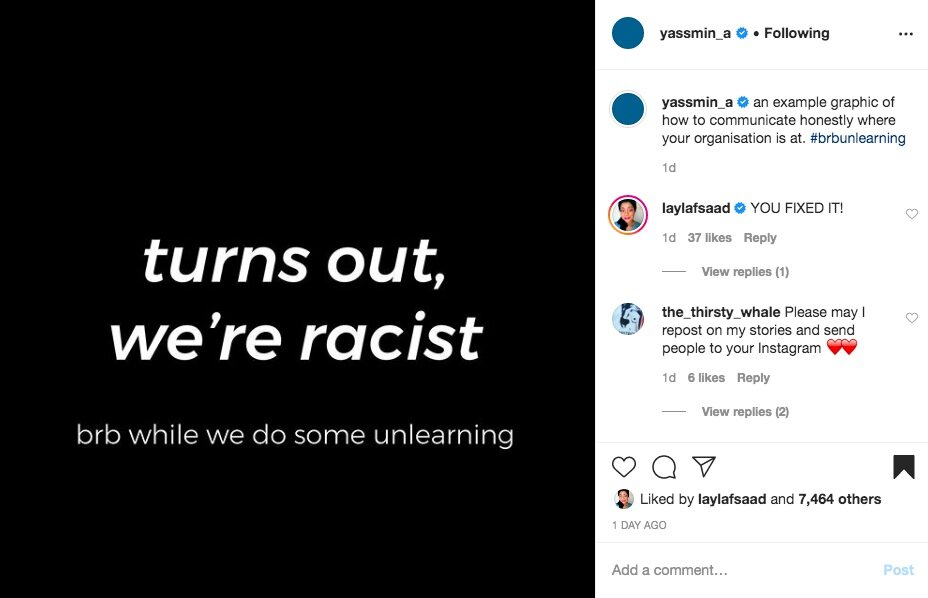How can brands support Black Lives Matter?
A collaborative piece by Maria Eilersen and Mitzi Wilson
We recognise the Black community is hurting. As two White women, we recognise our privilege and inherent bias in a society that perpetuates White supremacy, and we are continuing to educate ourselves on how we can help dismantle systemic racism and be better allies to the Black community and People of Colour. We believe racism has no place in the world we want to live in and that Black Lives Matter, not just today, but everyday. Note: this article is split across two sites - this is part two. We appreciate you reading.
After reviewing the four ways brands have responded to Black Lives Matter in part one of this blog post, we asked the question: how can brands respond in a meaningful way if they want to enact positive change?
Crisis best-practice is to respond quickly, even if all of the information has yet to be gathered. Communicate that you are aware of the situation - be specific - and that you are taking action. Let your audience know that you’re working behind the scenes to develop a response. Something like: “We’re aware of the [specify the situation] and are taking this time to fully understand so we can respond constructively.”
Issuing a holding statement gives you the time you need to prepare a thoughtful response without the pressure to issue a statement quickly.
A statement on social media ≠ a pass on accountability. Your statement must follow through with meaningful steps towards dismantling racism long term—for example, a one-off donation is not enough, but it’s a start. Brands that want to be part of the change must lead with action and actually do the work because we’re already behind.
So what does this look like for brands?
When it comes to doing the work, we must start internally. How educated are you on Black History in your area? Go beyond words - what actions can you take to dismantle systemic racism? Do you hire and promote BIPOC within your company? Are there BIPOC on your leadership team? Does your work culture permit racist behaviour? Plan for the road ahead - how will you implement changes moving forward and long term? Are your brand values anti-racist? Have you taken a political stand in the past? If not, why? And how is this different?
“I think seeing brands stand as allies at this time and speaking up about racism and issues concerning how black people are treated is a good thing,” Cephas Williams, founder of 56 Black Men, a campaign that challenges the negative stereotypes of Black men, told The Drum.
”Now is not the time to be silent, neither is it the time to jump on a bandwagon. It’s a time for real reflection and care with regards to how a brand and its leaders stand by the Black community at this time and move forward with real steps to end racism and injustice globally and not only on the streets but in their organizations too. Organizations can not promise that their staff are not racist, but they can promise that they will not tolerate it.”
When it comes to communication, check your privilege - what are your intentions? Again, what actions can you take to dismantle systemic racism internally and externally?
When you do decide to make a statement, make sure it is genuine with a focus on action. You will probably get it wrong. One statement cannot possibly resolve the injustice of Black lives being taken by the police, let alone systemic racism and White supremacy.
Assess past actions and take responsibility for mistakes you’ve made in the past—because the truth will come out. Assess the motivations behind your response - if you come from a place of wanting to enact change, you’ll likely find yourself less reactive.
“As they speak out against racism, many companies will face (or are already facing) scrutiny over their own actions, business practices that have hurt People Of Color, and a lack of diversity, especially in executive ranks,” writes The Morning Brew.
We’ll watch with interest to see the long-term communication strategies of brands that have been quick to respond to the Black Lives Matter movement.
Where will we be a year from now? Our hope is that this will lead to long-lasting change, with Black and People of Colour represented and celebrated in the media. A world where diversity within internal teams is mandatory and where everyone takes the time to listen, learn and be decent to one another, especially on social media.
As small business owners just starting out, we can make anti-racism part of our foundation and continue holding each other accountable. We're small brands with big voices - and we intend to use them.
Black Lives Matter, always.
What are your thoughts on this? What has your business communicated during this time?
Let me know in the comments.
Please take the time to read the resources below.
Comments from marketing experts:
Cephas Williams, founder of 56 Black Men, a campaign that challenges the negative stereotypes of Black men.
”I think seeing brands stand as allies at this time and speaking up about racism and issues concerning how Black people are treated is a good thing,”
”What we have to appreciate is that brands hold global influence on many levels, from the consumer to customer to employees and other parties, so for brands to be silent at this time could in fact do more harm than good.
”Now is not the time to be silent, neither is it the time to jump on a bandwagon. It’s a time for real reflection and care with regards to how a brand and its leaders stand by the black community at this time and move forward with real steps to end racism and injustice globally and not only on the streets but in their organizations too. Organizations can not promise that their staff are not racist, but they can promise that they will not tolerate it.”
Belinda Smith, Global Diversity Ambassador at the World Federation of Advertisers:
“Brands like Ben & Jerry’s, Netflix and American Express’s messages to the Black community are deeply appreciated because, outside of crisis, they demonstrate consistency and acknowledgement, which makes their words now authentic and empathetic,“ she says.
“Simply put, they have a relationship with the Black community. Their activist voice contributes to real change because they have acknowledged there is a problem, called it by its name openly and accept the costs.“
Deadra Rahaman, founder and president of Society Redefined
"Consumers are savvy enough to peel back the optics. How are you investing and impacting my community? We need brands to show up not just give us words," Rahaman asks.
Bemi Idowu, PR account director, Wimbart
“Like Nike did with Colin Kaepernick, we need brands to show what they truly stand for and reflect their values in the actions they take. Talk is cheap. When the dust settles and the issues are no longer front-page news, brands must ensure that they are doing everything they can to challenge and dismantle the pillars of structural racism wherever they come across it. Not just post and look away.”
Asad Dhunna, founder, The Unmistakables
“...take time to read the replies to the statements that brands have made, because that’s where the real insight lies.
Brand-owners need to understand that a tweet can only get them so far. Action must go deeper than optical allyship and performative activism – they have to be driven in organisational change, belief and business practices.
We'd advise considering whether the energy currently going into approvals would be better spent on mapping out a proper change programme that truly benefits the Black colleagues, consumers and community around you.
Societal change is going to take decades. Just look at the Pride movement. ‘Pride Month’ is probably on lots of people’s calendars from today, but we must remember that what started as a violent protest 51 years ago now attracts millions of pounds of sponsorship around the world – and even then, not everyone knows how to go about it.
It will take years of understanding and unlearning for brands to really find their place in social activism, particularly at a time when trust in government is rapidly declining in the UK and US. Those who take a long-term view will drive the most change.”
LJ Melville, founder of Marketing for Humans
“Too many brands take the politically correct road and have their lawyers write up perfectly crafted statements.
More than ever, we’re living in a time and age where our audience wants to feel as though they’re part of our brand. They want to know there are real people behind the brand, who really care about them; not just their money.
Open your brand up to connecting on a more human level with your audience.
One great way to open up that conversation with your audience is to appear on video, no matter the size of your brand. Allow people to get to know the person/people behind the brand. As humans, we’re a lot more likely to connect with someone if we can see and hear them, versus simply reading a statement on social media.
Also, don’t think you have to be perfect; be open to admitting your lack of understanding, and be open to questions and shares from your audience. A simple question box on your Instagram stories where you allow your audience to share their insights goes a long way in connecting with your audience and truly creating a community rather than just a following online.”
Rebekka Taylor, Marketing Professional, Brisbane:
“For brands that feel uneasy about the necessity to post a statement in solidarity. Unpack that uneasiness. Are there education gaps surrounding the history and experiences of People of Colour? Is it a lack of understanding surrounding Systemic Racism?
Moving forward together means acknowledging that the experiences of BIPOC peoples is different to your own and accepting that it is because of racism.
Take action to engage with community resources to better understand what impact racism has on others. And align what is learned with what needs to be done to ensure your brand culture is inclusive.”
Relevant reads:
75 Brand responses to #BlackLivesMatter
The Drum - why did brands to fail to pause ads on Black Out Tuesday?
Mashable - Brand tweets on being anti-racist are not enough
Black PR leaders on brand response (view using incognito mode to access)
PR Week - Brands Show Solidarity with George Floyd
Guardian - Grindr removes ethnicity filter
Do black lives matter enough for you to hire them for leadership positions?
Resources:
This Google Drive is full of Black Academic Resources

